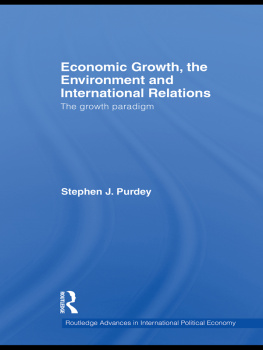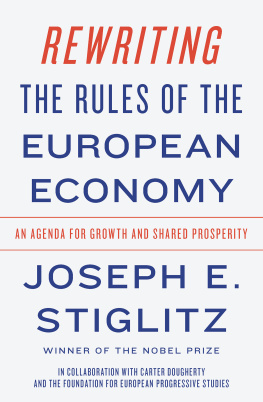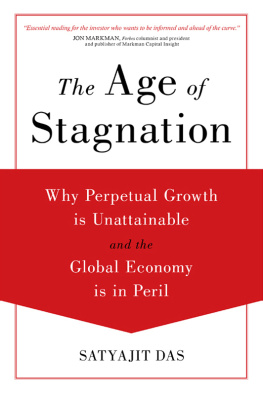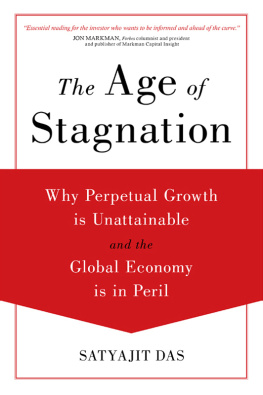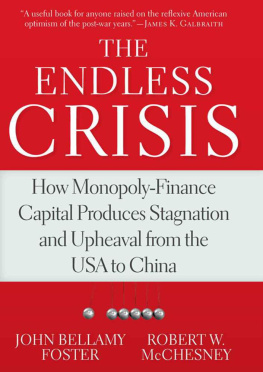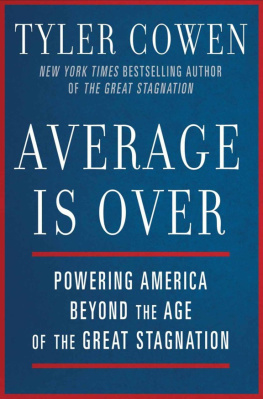Diminishing Returns
Diminishing Returns
The New Politics of Growth and Stagnation
Edited by
LUCIO BACCARO, MARK BLYTH,
AND JONAS PONTUSSON


Oxford University Press is a department of the University of Oxford. It furthers the Universitys objective of excellence in research, scholarship, and education by publishing worldwide. Oxford is a registered trade mark of Oxford University Press in the UK and certain other countries.
Published in the United States of America by Oxford University Press
198 Madison Avenue, New York, NY 10016, United States of America.
Oxford University Press 2022
All rights reserved. No part of this publication may be reproduced, stored in a retrieval system, or transmitted, in any form or by any means, without the prior permission in writing of Oxford University Press, or as expressly permitted by law, by license, or under terms agreed with the appropriate reproduction rights organization. Inquiries concerning reproduction outside the scope of the above should be sent to the Rights Department, Oxford University Press, at the address above.
You must not circulate this work in any other form and you must impose this same condition on any acquirer.
Names: Baccaro, Lucio, editor. | Blyth, Mark, 1967- editor. | Pontusson,
Jonas, editor.
Title: Diminishing returns : the new politics of growth and stagnation /
edited by Lucio Baccaro, Mark Blyth, and Jonas Pontusson.
Description: New York, NY : Oxford University Press, [2022] |
Includes bibliographical references and index.
Identifiers: LCCN 2021060907 (print) | LCCN 2021060908 (ebook) |
ISBN 9780197607862 (paperback) | ISBN 9780197607855 (hardback) |
ISBN 9780197607886 (epub)
Subjects: LCSH: Macroeconomics. | Keynesian economics. |
Economic development. | Stagnation (Economics)
Classification: LCC HB172.5 .D56 2022 (print) |
LCC HB172.5 (ebook) | DDC 339dc23/eng/20220304
LC record available at https://lccn.loc.gov/2021060907
LC ebook record available at https://lccn.loc.gov/2021060908
DOI: 10.1093/oso/9780197607855.001.0001
Contents
Lucio Baccaro, Mark Blyth, and Jonas Pontusson
Engelbert Stockhammer and zlem Onaran
Herman Mark Schwartz
Herman Mark Schwartz and Mark Blyth
Alison Johnston and Matthias Matthijs
Yeling Tan and James Conran
Jazmin Sierra
Cornel Ban and Drago Adscliei
Alexander Reisenbichler and Andreas Wiedemann
Lucio Baccaro and Martin Hpner
Lennart Erixon and Jonas Pontusson
Lucio Baccaro and Fabio Bulfone
Dorothee Bohle and Aidan Regan
Cornel Ban and Oddn Helgadttir
Jonathan Hopkin and Dustin Voss
Evelyne Hbscher and Thomas Sattler
Julia Lynch and Sara Watson
Jonas Nahm
This volume originates in a research project at the University of Geneva, directed by Lucio Baccaro and Jonas Pontusson and funded by the Swiss National Science Foundation (grant no. 100017_166186). An initial exploratory workshop took place at the Max Planck Institute for the Study of Societies in May 2018. Subsequently, two additional workshops were held: at Brown University in August 2019, where first versions of most chapters were presented and discussed, and at the Max Planck Institute for the Study of Societies in January 2020, where after another round of discussion the content of the volume was finalized.
The editors are indebted to Lucy Barnes, Jens Beckert, Robert Boyer, Daniela Gabor, Peter Hall, Anke Hassel, Silja Husermann, Chris Howell, Sebastian Kohl, Costas Lapavitsas, Renate Mayntz, Bruno Palier, Fritz Scharpf, David Soskice, Alexander Spielau, Wolfgang Streeck, and Till van Treeck, for presenting or commenting on papers at the first workshop. They would also like to express their gratitude to Puneet Bhasin, Benjamin Braun, Bjrn Bremer, Sinisa Hadziabdic, Manolis Kalaitzake, Erik Neimanns, Erik Peinert, Sid Rothstein, Mischa Stratenwerth, Arianna Tassinari, Tobias Tober, Leon Wansleben, and Josh Weitz for frequent conversations and comments on the project embodied by this volume. Claudia Werner provided superb administrative support throughout. Finally, we, the editors, wish to thank chapter authors for their cooperation and their intellectual contributions to the project.
Dragos Adascalitei
Research Officer, European Foundation for the Improvement of Living and Working Conditions
Lucio Baccaro
Director, Max Planck Institute for the Study of Societies (Cologne)
Cornel Ban
Associate Professor of International Political Economy, Copenhagen Business School
Mark Blyth
Professor of international Economics, Brown University (Providence, RI)
Dorothee Bohle
Professor of Political Science, University of Vienna
Fabio Bulfone
Assistant Professor, Leiden University
James Conran
Assistant Professor of Political Science, University of Oregon (Eugene, OR)
Lennart Erixon
Emeritus Professor, Department of Economics, University of Stockholm
Oddn Helgadttir
Assistant Professor, Copenhagen Business School
Jonathan Hopkin
Professor of Comparative Politics, London School of Economics
Martin Hpner
Professor, Max Planck Institute for the Study of Societies (Cologne)
Evelyne Hbscher
Associate Professor of Comparative Politics and Public Policy, Central European University (Vienna)
Alison Johnston
Associate Professor of Political Science, Oregon State University (Corvallis, OR)
Julia Lynch
Professor of Political Science, University of Pennsylvania (Philadelphia, PA)
Matthias Matthijs
Associate Professor of International Political Economy, Johns Hopkins SAIS (Washington, DC)
Jonas Nahm
Assistant Professor of Energy, Resources and Environment, Johns Hopkins SAIS (Washington, DC)
zlem Onaran
Professor of Economics, University of Greenwich
Jonas Pontusson
Professor of Comparative Politics, University of Geneva
Aidan Regan
Associate Professor, University College Dublin
Alexander Reisenbichler
Assistant Professor of Political Science, University of Toronto
Thomas Sattler
Associate Professor of International Relations, University of Geneva
Herman Mark Schwartz
Professor of Politics, University of Virginia (Charlottesville, VA)
Jazmin Sierra
Assistant Professor of Political Science, University of Notre Dame (South Bend, IN)
Engelbert Stockhammer
Professor of International Political Economy, Kings College London
Yeling Tan
Assistant Professor of Political Science, University of Oregon (Eugene, OR)
Dustin Voss
PhD candidate, London School of Economics
Sara Watson
Associate Professor of Political Science, Ohio State University (Columbus, OH)
Andreas Wiedemann
Assistant Professor of Politics, Princeton University (Princeton, NJ)
Lucio Baccaro, Mark Blyth, and Jonas Pontusson
), growth has become increasingly difficult to generate across the advanced economies, giving rise to a host of new problems, from financial instability to the collapse of mainstream parties. Simply put, the questions that motivate our project are the following: If the main mechanism for securing the legitimacy of democratic capitalism is the ability to produce (and widely diffuse) economic growth, what happens when growth is harder to come by and less broadly shared? And how should we think about capitalist diversityvarieties of capitalismin the context of global stagnation?


